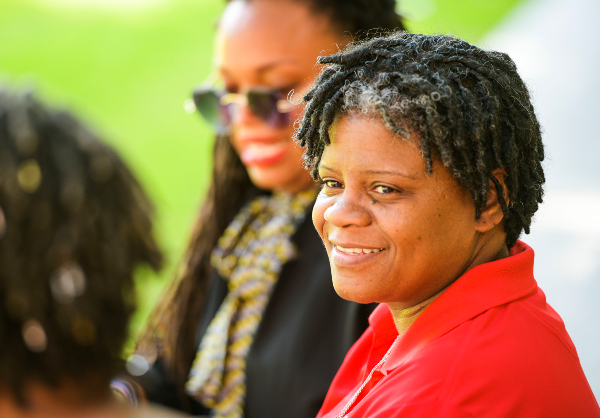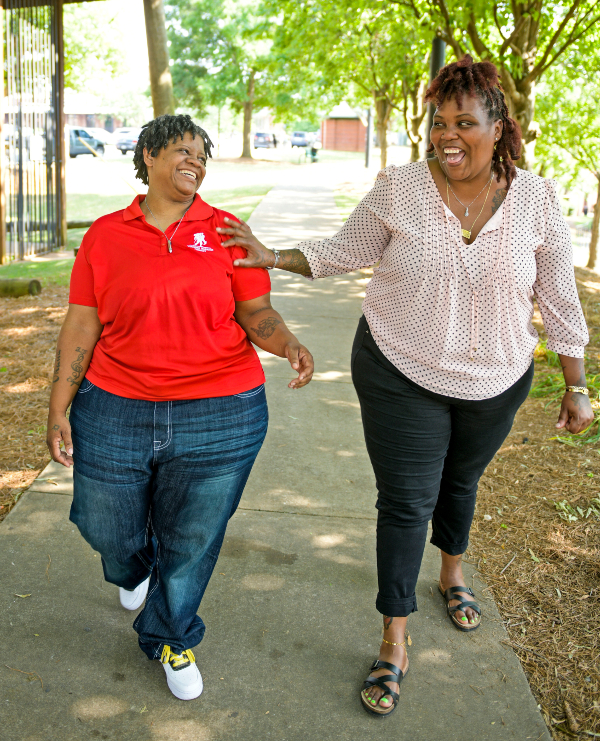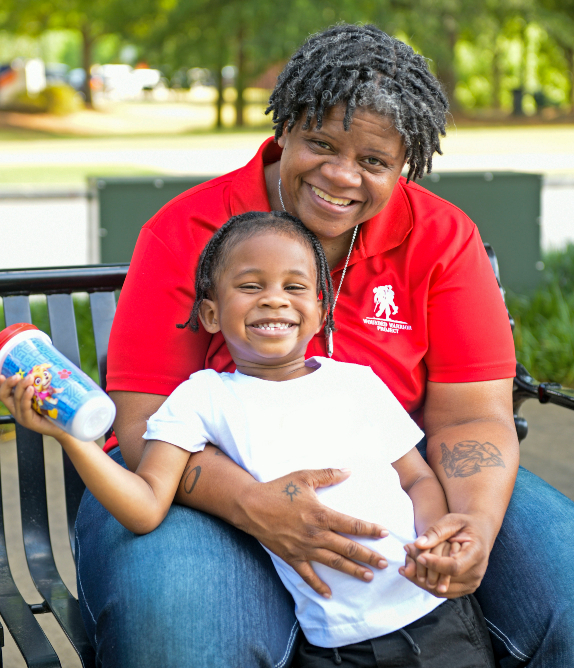Air Force Veteran Finds Freedom From PTSD Through Wounded Warrior Project Support Programs

If Air Force veteran Sam Hargrove could step back in time, she would.
She would remind herself to have faith amid the dark moments when she tried to drown her post-traumatic stress disorder (PTSD) symptoms in alcohol.
Fortunately, Sam held on to a bit of faith and found support through Wounded Warrior Project® (WWP). The nonprofit’s programs for veterans with PTSD help turn every obstacle into a milestone and every step into a new path.
Reflecting on where she is today, Sam credited faith, a new network of support through WWP, and the tough love she learned from her adoptive father, the late Clyde Draine, whom she called “Pop.”
Pop shared stories and photos of his Army service in an Explosive Ordnance Disposal unit during the Vietnam War.
“He was a huge influence in my life,” Sam said. “He said what I needed to hear.”
Pop, and an older brother who served in the Marine Corps, recommended that Sam enlist in the Air Force. She took their advice, enlisted, and received training in computer networking and operating systems, eventually using her expertise while deployed in Korea and Iraq.
During her 11 years of active duty, Sam served in the 54th Combat Communications Squadron, where she made friends for life. “I still have individuals from that unit who I consider brothers and sisters,” Sam said. They lived through trying times while serving together.
Feeling Hopeless
Sam and her unit went through a couple of close calls in Iraq, including a base bombing. She separated from the military in late 2007, returned to Georgia, and tried reconnecting with her family, but she was not the same Sam. She was moody and lashed out at her loved ones. She drank heavily “to stop the thoughts and the flashbacks” of her time in Iraq.
“When I came back home to Georgia, I stayed near Fort Benning and could hear the gunshots in the distance when they were having field exercises,” Sam recalled. “I felt like I was right back in Iraq, and I literally would slide across the bed to take cover.” This is one of many symptoms of PTSD in veterans. In a WWP survey of the wounded warriors it serves, 76% of the veterans WWP serves reported living with PTSD symptoms.
“I finally realized my condition when my godson told me he was scared of me because of my anger,” Sam said.
The nightmares and thoughts continued, and Sam got to the point of hopelessness: “It got so real that I got myself really drunk one night and jumped behind the wheel of my car and thought about turning into a tree and just ending it all.”
Sam made it home, but that episode made her realize she was in danger. The next day she asked her VA counselor for help. She was sent to a 90-day inpatient program in New York.
Reckoning and Growing
While the VA program helped Sam through a crisis period, her long-term mental health continued to be a challenge. Despite inner turmoil, Sam knew there were options for her, and she knew her love for her partner, nieces, nephews, and new stepchildren was stronger than her PTSD.
Watch veteran Sam Hargrove discuss her experience with WWP's Warrior Care Network.
At first, she didn’t consider WWP. “I would always see the commercials for Wounded Warrior Project and it was always a Purple Heart recipient or something like that,” Sam recalled. “I don’t have a Purple Heart – I just got anger issues. So, I didn’t think it was for me at all.”
Soldier Ride
Despite that hesitation, and at the urging of her partner, Sam reached out to WWP and found out about peer support groups where she felt welcomed. She also connected with Soldier Ride®. This nationally recognized cycling program allows warriors to make lasting connections through a collective physical challenge where no one is left behind. Soldier Ride tested Sam physically and, more importantly, connected her to other veterans.
For Sam, Soldier Ride opened the door to other forms of healing. “Soldier Ride helped me push myself and tell myself I can do anything I put my mind to; I don’t have to be limited by injuries or ailments. It made me feel like I was fresh in the military, like you can’t tell me I can’t — because I’m going to show you I can. It was a freeing moment for me spiritually and emotionally.”
Project Odyssey

When Sam felt she was on the right path, she sought the next step in her healing journey. WWP was there to provide solutions. Sam attended a Project Odyssey® and later attended a couples’ Project Odyssey with her life partner, Onishka Miller.
They used this opportunity to work through issues, which saved their relationship, and Sam felt empowered to find emotional stability.
During a couples’ Project Odyssey, the focus is on relationships. Veterans and their significant others first participate in a multi-day mental health workshop focused on the effects of PTSD, TBI, and other combat stress. Through adventure-based activities and mental health education, couples then learn more about communication, conflict management, among other concepts. The following 12 weeks of the program provide continuous coaching from WWP staff to reinforce what was learned during the in-person portion.
Warrior Care Network
Later, Sam discovered Warrior Care Network®. This WWP program connects wounded veterans and their families with world-class mental health care through four partner academic medical centers.
Through two-week intensive outpatient programs, Warrior Care Network provides care tailored to each veteran and family member. The programs integrate behavioral health care, rehabilitative medicine, wellness, nutrition, mindfulness training, and family support. Sam participated with the Warrior Care Network program in Atlanta, at Emory Healthcare.
“I jumped right in — I was ready to rip the Band-Aid off. It was like my Pop telling me what I needed to hear. So, even though I admitted I wasn’t sure I wanted to be there, I opened up. As you tell your story, more parts come back. It puts you in an uncomfortable spot, and you have to be willing to feel uncomfortable to get to where you want to be. I was shocked that I was able to do it.”
Sam dug deep and found ways to build bridges between herself and others. “It was an intense moment. I finally got it all out when I took part in Warrior Care Network, so that’s why I’m such an advocate for Wounded Warrior Project. I would have never gone to that program without Wounded Warrior Project. I would never have been able to tap into exactly what the issue was.”
Sam was able to face her fears and triggers head on and understand how to manage her PTSD at a deeper level. “I learned more about myself during those two weeks [at Warrior Care Network] than I have in a long time,” Sam said.
Sharing Support for PTSD
The WWP programs Sam participated in set her on the right path to protecting the relationships that matter most to her. “I started to communicate better at Project Odyssey, and being at Emory for two weeks helped me be more understanding of what my partner Onishka goes through when dealing with me. Both programs really helped our relationship.”
Sam describes herself as “calmer and more problem-solving” now. She stays in touch with her godson, who is now 23, and she has a new grandson who brightens her life.

“I know I have PTSD, but I also know that I have a support system like Wounded Warrior Project, my partner Onishka, our kids, and grandkids,” Sam said. “When I sit back and think about the things I’ve been through, I think, ‘What can I do to help somebody else get to where I am?’”
Sam’s down-to-earth character makes her accessible to other veterans who can relate to her journey. WWP has provided opportunities for Sam to tell her story through connection events, media interviews, and video gaming via Twitch.
Sam values her family and friends and recognizes how far she has come since reentering civilian life. “Everybody used to say to me, ‘You were so loving, and then you just got angry.’ Now I’m loving with a big heart again.”
Get connected today or read more about how WWP helps.
Contact: Raquel Rivas – Public Relations, rrivas@woundedwarriorproject.org, 904.426.9783
About Wounded Warrior Project
Since 2003, Wounded Warrior Project® (WWP) has been meeting the growing needs of warriors, their families, and caregivers — helping them achieve their highest ambition. Learn more.